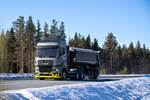Tremonia Mobility delivers efficient, sustainable composite minibuses with Siemens Xcelerator
Minibus manufacturer adopts Siemens Xcelerator to advance electrification, improving design cycle speed by 20% and design adjustment speed by 30%.
Tremonia Mobility public transport, shuttle and travel services. Source (All Images) | Tremonia Mobility GmbH
’s (Plano, Texas, U.S.) Xcelerator digital business platform that includes software, services and an application development platform, has been adopted by minibus manufacturer (Dortmund, Germany). Xcelerator will be used to accelerate the electrification and optimize the development of Tremonia’s products for public transport, shuttle and travel services. The company’s vehicles, particularly its Composite Mobility range (midibus and midicoach models) are built with composite chassis.
Tremonia Mobility, originally part of Daimler Corp. (Portland, Ore., U.S.) has produced more than 25,000 premium minibuses for various services and became an independent company in 2022. The company is dedicated to designing environmentally friendly, efficient and customizable minibuses.
“The decision to use Siemens Xcelerator is the result of a clear goal: We want to act faster while remaining cost-effective,” says Josa Prinz, CEO and CTO at Tremonia Mobility. “The design and engineering capabilities in Siemens Xcelerator enable us to document parts, components and 3D layouts more efficiently concerning breadth and depth and streamline and make processes more agile.”
The combination of design tools from the Siemens’ Designcenter suite has enabled Tremonia Mobility to improve its process optimization, creating an ideal solution set for a medium-sized company. This not only facilitates onboarding employees but also enables Tremonia Mobility to respond more efficiently and flexibly to customers’ needs. With the Siemens Xcelerator software available across its global design teams in Dortmund, Germany, and India, Tremonia Mobility says it has sped up design cycles by 20% and increased the speed of design adjustments by 30%.
“We have high standards for our production and quality checks, and in how we design and fulfil the customer requirements,” says Christian Wünsch, head of R&D and product management at Tremonia Mobility. “We specialize in city buses, which normally require meeting high standards, such as safety assists, passenger information systems and interior design. Using Siemens Xcelerator is also beneficial due to its embedded synchronous technology, which enables us to do part changes quickly. This helps because we are working with large amounts of data and legacy data.”
“Adapting to alternative drives and reducing emissions are challenges we actively address,” adds Prinz. “With a broad spectrum of customers, from small bus companies to municipalities, we are on a good path to establishing ourselves globally. The partnership with Siemens and the use of design tools are a good start, but the expansion and deepening of this collaboration are still ahead. A broader integration of Siemens tools, for example, optimizing upstream and downstream processes, is part of our future focus.”
Related Content
-
Dawn Aerospace reusable rocket-powered aircraft flies twice in one day
Eighth and ninth flights of composites-intensive Mk-II Aurora reach an altitude of 63,000 feet, demonstrates same-day reusability capability for rocket-powered systems.
-
Infinite Composites: Type V tanks for space, hydrogen, automotive and more
After a decade of proving its linerless, weight-saving composite tanks with NASA and more than 30 aerospace companies, this CryoSphere pioneer is scaling for growth in commercial space and sustainable transportation on Earth.
-
Sinonus launches energy-storing carbon fiber
Swedish deep-tech startup Sinonus is launching an energy-storing composite material to produce efficient structural batteries, IoT devices, drones, computers, larger vehicles and airplanes.







